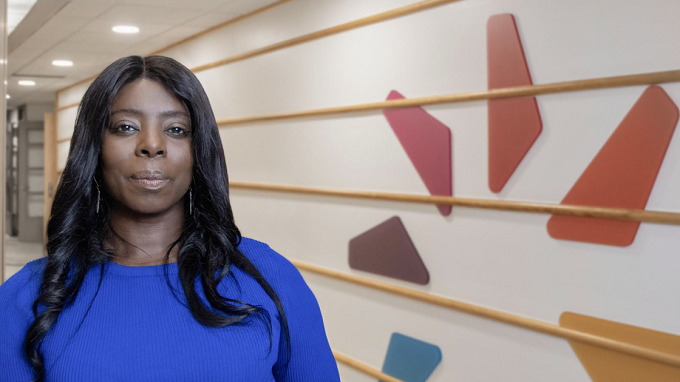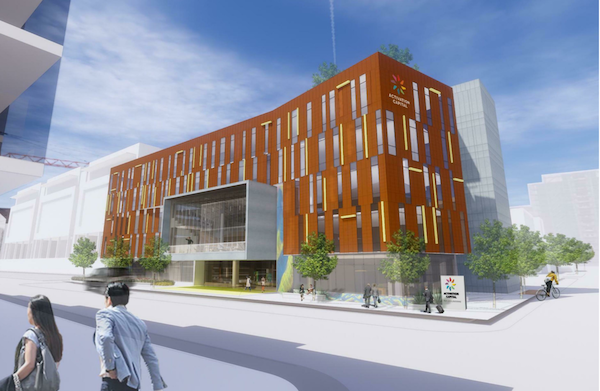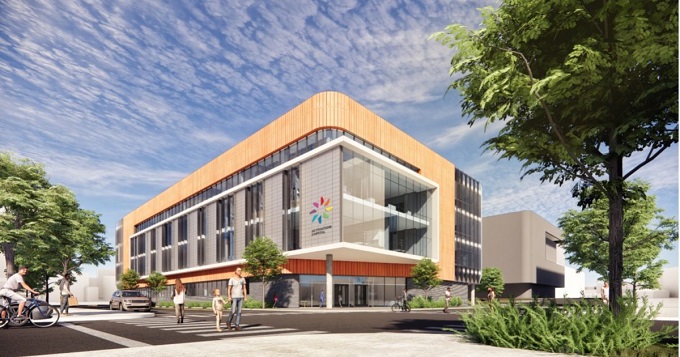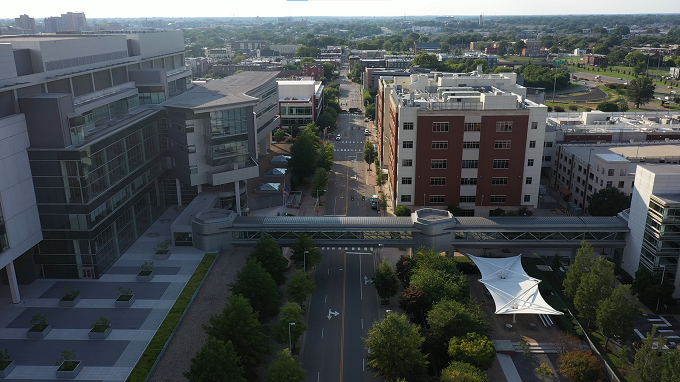
Chandra Briggman is departing Activation Capital after four years as CEO. (Images courtesy Activation Capital)
The head of Activation Capital is out after a four-year run, while the fate of the group’s long-planned development project she had championed appears to be in question.
Chandra Briggman, who has led Activation Capital and the Virginia BioTechnology Research Park as CEO since May 2020, is parting ways to pursue new career opportunities, according to an announcement distributed Monday.
The release from Activation Capital, which operates the 34-acre downtown campus also known as the VA Bio+Tech Park, includes comments from Briggman, who described her job there as completed.
“At heart, I’m a builder, and what I do well, I have done,” Briggman said in the release.
Later, she added: “Together, we built a team of experts who are focused on execution and excellence during the next phase of Activation Capital. My goal was always to create the team, prove our model, and then transition to the next opportunity to build.”
Attempts to reach Briggman for further comment were unsuccessful.
Briggman’s departure follows a series of closed-door meetings held in late June by Activation Capital’s Board of Directors, which met in closed session twice over the course of two weeks to discuss “a sensitive employee issue,” according to minutes of the board’s June 18 meeting.
Her exit also comes as the board had been set to vote on a pre-development budget for Activation Capital’s Innovation Center building it’s been planning at 706 E. Leigh St. on the biotech park campus.
The building had initially been proposed in 2019 as six stories and 100,000 square feet. Two years later, the project was being reworked in light of demand for life sciences space.
A resolution to approve the pre-development budget, the amount of which wasn’t specified in the meeting minutes, had been on the agenda for the board’s previous meeting in March but was delayed to the June 18 meeting, where a discussion and vote of a “redesigned Innovation Center project” were postponed to “a later date.”
It was around the time of the June 18 meeting that Briggman tendered her resignation, according to people familiar with the events who asked for anonymity to discuss them.
Briggman and her staff had raised $31 million for the development project and had been searching for an anchor tenant, with VCU’s Massey Cancer Center mentioned recently, according to minutes of the authority’s finance, audit and real estate committee.
At the committee’s June meeting, staff outlined secured funding and potential additional funding for the project, the cost of which had increased above the amount of funds that had been secured, the people familiar with the events said.
Building costs were expected to “increase significantly” to meet Massey’s requirements, though its tenancy would open up fundraising opportunities, according to the minutes. The innovation center was projected last year to cost $53 million, according to a Virginia Business report.

An earlier rendering of the 100,000-square-foot building when it was first proposed in 2019. (BizSense file)
According to the minutes, the presentation “pivoted to a new redesign of the Innovation Center to create optionality and de-risk the project.” A majority of board members agreed that more information was needed before a vote could be taken.
A week later, following the personnel-related closed session at the June 18 board meeting, member Garrison Coward made a motion to authorize the chair and vice chair to hire outside legal counsel on behalf of the board, to which member Art Espey seconded. The motion passed 7-1, with Lincoln Saunders casting the dissenting vote. The specific reason for outside legal counsel was not specified in the minutes.
Saunders, chief administrative officer for the City of Richmond, was sitting in on the meeting for Mayor Levar Stoney, who is one of the board’s nine members.
Coming out of a closed session at a special June 28 meeting, a motion was made by Caren Merrick, the board’s vice chair who was leading the meeting, to authorize her “to act upon items as agreed to in the closed session.” The motion passed, again with Saunders casting a lone dissenting vote.
Asked Monday why he voted against the motions, Saunders said he couldn’t explain his vote without violating the confidentiality of the closed session.
“I can only say that I voted no because I did not agree with the approach the board has taken,” Saunders said. “There’s been incredible progress at Activation Capital these past four years. Ms. Briggman has brought new funding and energy to the innovative district, and I’m sorry to see her leave.”
Merrick, the state commerce and trade secretary under Gov. Glenn Youngkin, was leading the special meeting in the absence of Michael Rao, the board’s chairman. Rao is president of Virginia Commonwealth University and board chair of VCU Health, whose downtown campus is adjacent to the biotech park.
The Activation Capital board represents the Virginia Biotechnology Partnership Authority, which oversees Activation Capital and is an independent authority of Virginia, with many of its members appointed by the governor.
In addition to Coward and Espey, other board members include Donna Edmonds, John Gerber, Charles Macfarlane and Jennifer (“DJ”) Nordquist. Coward and Edmonds were appointed by Youngkin in July 2023, and Gerber and Nordquist were appointed by the governor three months earlier.
Monday’s announcement about Briggman’s departure included comments from Rao, who did not respond to a request from BizSense for additional comment.
“In four years, two of which were at the height of the COVID-19 pandemic, she helped reenergize the organization with a new vision and strategy,” Rao said in the release. “Chandra executed a bold roadmap that has since grown our regional innovation economy and strengthened Activation Capital’s sustainability model for the future.”
The release credits Briggman, who was recruited from a nonprofit in Boston, with raising $50 million to support Activation Capital’s innovation development ecosystem, working with stakeholders to land $53 million through the federal Build Back Better Regional Challenge, modernizing systems and operations, and raising the $31 million for the innovation center.
The status of the innovation center project was unclear this week. Kipton Currier, Activation Capital’s vice president of operations, said the innovation center “is progressing” when reached Monday.
The release states that an interim CEO will be named soon and a search for a long-term replacement will be conducted.

Chandra Briggman is departing Activation Capital after four years as CEO. (Images courtesy Activation Capital)
The head of Activation Capital is out after a four-year run, while the fate of the group’s long-planned development project she had championed appears to be in question.
Chandra Briggman, who has led Activation Capital and the Virginia BioTechnology Research Park as CEO since May 2020, is parting ways to pursue new career opportunities, according to an announcement distributed Monday.
The release from Activation Capital, which operates the 34-acre downtown campus also known as the VA Bio+Tech Park, includes comments from Briggman, who described her job there as completed.
“At heart, I’m a builder, and what I do well, I have done,” Briggman said in the release.
Later, she added: “Together, we built a team of experts who are focused on execution and excellence during the next phase of Activation Capital. My goal was always to create the team, prove our model, and then transition to the next opportunity to build.”
Attempts to reach Briggman for further comment were unsuccessful.
Briggman’s departure follows a series of closed-door meetings held in late June by Activation Capital’s Board of Directors, which met in closed session twice over the course of two weeks to discuss “a sensitive employee issue,” according to minutes of the board’s June 18 meeting.
Her exit also comes as the board had been set to vote on a pre-development budget for Activation Capital’s Innovation Center building it’s been planning at 706 E. Leigh St. on the biotech park campus.
The building had initially been proposed in 2019 as six stories and 100,000 square feet. Two years later, the project was being reworked in light of demand for life sciences space.
A resolution to approve the pre-development budget, the amount of which wasn’t specified in the meeting minutes, had been on the agenda for the board’s previous meeting in March but was delayed to the June 18 meeting, where a discussion and vote of a “redesigned Innovation Center project” were postponed to “a later date.”
It was around the time of the June 18 meeting that Briggman tendered her resignation, according to people familiar with the events who asked for anonymity to discuss them.
Briggman and her staff had raised $31 million for the development project and had been searching for an anchor tenant, with VCU’s Massey Cancer Center mentioned recently, according to minutes of the authority’s finance, audit and real estate committee.
At the committee’s June meeting, staff outlined secured funding and potential additional funding for the project, the cost of which had increased above the amount of funds that had been secured, the people familiar with the events said.
Building costs were expected to “increase significantly” to meet Massey’s requirements, though its tenancy would open up fundraising opportunities, according to the minutes. The innovation center was projected last year to cost $53 million, according to a Virginia Business report.

An earlier rendering of the 100,000-square-foot building when it was first proposed in 2019. (BizSense file)
According to the minutes, the presentation “pivoted to a new redesign of the Innovation Center to create optionality and de-risk the project.” A majority of board members agreed that more information was needed before a vote could be taken.
A week later, following the personnel-related closed session at the June 18 board meeting, member Garrison Coward made a motion to authorize the chair and vice chair to hire outside legal counsel on behalf of the board, to which member Art Espey seconded. The motion passed 7-1, with Lincoln Saunders casting the dissenting vote. The specific reason for outside legal counsel was not specified in the minutes.
Saunders, chief administrative officer for the City of Richmond, was sitting in on the meeting for Mayor Levar Stoney, who is one of the board’s nine members.
Coming out of a closed session at a special June 28 meeting, a motion was made by Caren Merrick, the board’s vice chair who was leading the meeting, to authorize her “to act upon items as agreed to in the closed session.” The motion passed, again with Saunders casting a lone dissenting vote.
Asked Monday why he voted against the motions, Saunders said he couldn’t explain his vote without violating the confidentiality of the closed session.
“I can only say that I voted no because I did not agree with the approach the board has taken,” Saunders said. “There’s been incredible progress at Activation Capital these past four years. Ms. Briggman has brought new funding and energy to the innovative district, and I’m sorry to see her leave.”
Merrick, the state commerce and trade secretary under Gov. Glenn Youngkin, was leading the special meeting in the absence of Michael Rao, the board’s chairman. Rao is president of Virginia Commonwealth University and board chair of VCU Health, whose downtown campus is adjacent to the biotech park.
The Activation Capital board represents the Virginia Biotechnology Partnership Authority, which oversees Activation Capital and is an independent authority of Virginia, with many of its members appointed by the governor.
In addition to Coward and Espey, other board members include Donna Edmonds, John Gerber, Charles Macfarlane and Jennifer (“DJ”) Nordquist. Coward and Edmonds were appointed by Youngkin in July 2023, and Gerber and Nordquist were appointed by the governor three months earlier.
Monday’s announcement about Briggman’s departure included comments from Rao, who did not respond to a request from BizSense for additional comment.
“In four years, two of which were at the height of the COVID-19 pandemic, she helped reenergize the organization with a new vision and strategy,” Rao said in the release. “Chandra executed a bold roadmap that has since grown our regional innovation economy and strengthened Activation Capital’s sustainability model for the future.”
The release credits Briggman, who was recruited from a nonprofit in Boston, with raising $50 million to support Activation Capital’s innovation development ecosystem, working with stakeholders to land $53 million through the federal Build Back Better Regional Challenge, modernizing systems and operations, and raising the $31 million for the innovation center.
The status of the innovation center project was unclear this week. Kipton Currier, Activation Capital’s vice president of operations, said the innovation center “is progressing” when reached Monday.
The release states that an interim CEO will be named soon and a search for a long-term replacement will be conducted.





Very interesting. Between this and the news that another City Comm person had their P-card stripped (and due to cloak and dagger of City and state we don’t get to see the full picture of our tax dollar spending), I wonder if this was her overall spending habits/ budget plan, another public building deal failure with , or just a general change in the appointees direction based on politics.
There are a few “Usual Suspects” named in this article. Again tied to real-estate and finance deals wrapped in secrecy. Lets see how this one plays out…